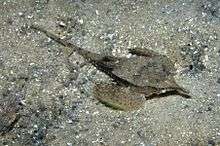Pegasus
Translingual
Proper noun
Pegasus m
Hypernyms
- (genus): Vertebrata - subphylum; Gnathostomata - infraphylum; Osteichthyes - superclass; Actinopterygii - class; Neopterygii - subclass; Teleostei - infraclass; Acanthopterygii - superorder; Gasterosteiformes - order; Pegasidae - family
Hyponyms
- (genus): Pegasus lancifer, Pegasus laternarius, Pegasus volitans - species
References



English
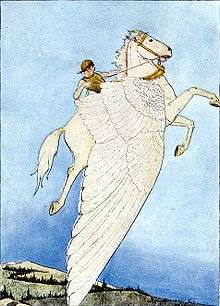
Pegasus and Bellerophon, from Myths Every Child Should Know, edited by Hamilton Wright Mabie (1914).
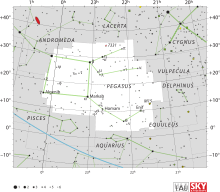
Map of the Pegasus constellation.
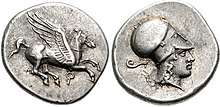
Pegasus on a stater of Corinth, circa 400–375 BCE.
Etymology
From Latin, from Ancient Greek Πήγασος (Pḗgasos), traditionally associated with πηγή (pēgḗ, “spring, fountain, fountain fed by a spring”), especially used to denote springs of Ocean, where Perseus killed Medusa, from whose blood Pegasus sprang. Some have dismissed this as folk etymology and suggest a pre-Greek origin because of the -ασος suffix.
Proper noun
Pegasus
- (Greek mythology) A winged horse fabled to have sprung from the blood of Medusa when she was slain. He is noted for causing, with a blow of his hoof, Hippocrene, the inspiring fountain of the Muses, to spring from Mount Helicon. Bellerophon tamed and rode upon Pegasus when he defeated the Chimaera.
- (astronomy) A constellation of the northern sky, near the vernal equinoctial point, representing the winged horse. Its three brightest stars, with the brightest star of Andromeda, form the asterism of the Great Square of Pegasus.
Meronyms
Translations
mythical winged horse
|
constellation
Noun
Pegasus (plural Pegasi)
Finnish
Declension
| Inflection of Pegasus (Kotus type 39/vastaus, no gradation) | |||
|---|---|---|---|
| nominative | Pegasus | — | |
| genitive | Pegasuksen | — | |
| partitive | Pegasusta | — | |
| illative | Pegasukseen | — | |
| singular | plural | ||
| nominative | Pegasus | — | |
| accusative | nom. | Pegasus | — |
| gen. | Pegasuksen | ||
| genitive | Pegasuksen | — | |
| partitive | Pegasusta | — | |
| inessive | Pegasuksessa | — | |
| elative | Pegasuksesta | — | |
| illative | Pegasukseen | — | |
| adessive | Pegasuksella | — | |
| ablative | Pegasukselta | — | |
| allative | Pegasukselle | — | |
| essive | Pegasuksena | — | |
| translative | Pegasukseksi | — | |
| instructive | — | — | |
| abessive | Pegasuksetta | — | |
| comitative | — | — | |
See also
- Pegasos
Latin
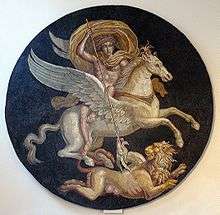
Bellerophon mounted on Pegasus vanquishing the Chimera, restored central medallion of a large Roman mosaic found in 1830 in Autun (Saône-et-Loire, France).
Etymology
From Ancient Greek Πήγασος (Pḗgasos).
Pronunciation
- (Classical) IPA(key): /ˈpeː.ɡa.sus/, [ˈpeː.ɡa.sʊs]
Proper noun
Pēgasus m (genitive Pēgasī); second declension
- (Greek mythology) Pegasus
- A Roman cognomen — famously held by:
- (Lucius?) Plotius Pegasus (a Roman senator and jurisconsult active under the Flavian dynasty)
Declension
Second declension.
| Case | Singular |
|---|---|
| Nominative | Pēgasus |
| Genitive | Pēgasī |
| Dative | Pēgasō |
| Accusative | Pēgasum |
| Ablative | Pēgasō |
| Vocative | Pēgase |
Derived terms
- Pēgasēius
- Pēgasiānus
References
- Pegasus in Charlton T. Lewis and Charles Short (1879) A Latin Dictionary, Oxford: Clarendon Press
- Pegasus in Gaffiot, Félix (1934) Dictionnaire Illustré Latin-Français, Hachette
Further reading


This article is issued from
Wiktionary.
The text is licensed under Creative
Commons - Attribution - Sharealike.
Additional terms may apply for the media files.
